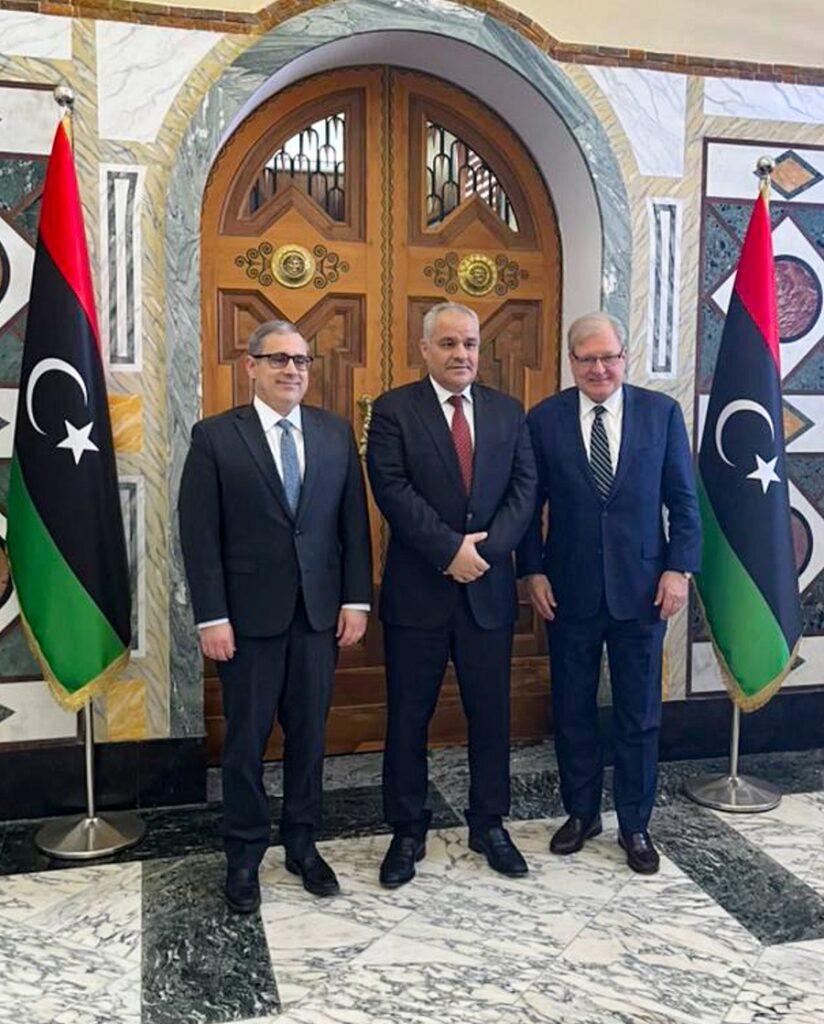Benghazi—The Libyan House of Representatives has strongly reiterated its demand that foreign diplomats should abide by international norms and the Vienna Convention of Diplomatic Relations and respect Libyan sovereignty. It also called on the UN mission in Libya to adhere to its role as a facilitator without transgressing or interfering.
A statement issued by the first Deputy Speaker of the House of Representatives Mr. Fawzi Al-Nuwairi on 18 February 2025 strongly criticized recurrent excesses made by a number of foreign ambassadors which entail external interference in Libya’s internal affairs, citing as an example the case of the Central Bank of Libya (CBL).
There is a “need to respect the sovereignty of the Libyan state and its national institutions, and not to allow any foreign interference in its internal affairs, especially with regard to sovereign institutions such as the Central Bank of Libya, whose Board of Directors has been fully formed in accordance with the approved legal procedures,” the statement said.
On 18 February, the US Special Envoy Ambassador Richard Norland held talks with the Governor of the Central Bank of Libya (CBL) Mr. Naji Issa at the bank’s headquarters in Tripoli.
Mr. Norland said on US Embassy’s X platform that he and US Charge d’Affaires Berndt “discussed with Issa US support for the CBL’s independence, its technocratic integrity, and its efforts to improve transparent revenue management. We are committed to partnering with Libya to help it promote economic stability and long-term prosperity.”

According to the US Embassy in Libya’s X platform, within the span of two days, both the US Special Envoy and US Charge d’Affaires have held talks with a number of heads of sovereign institution.
Including the head of the Audit Bureau Khaled Shakshak, Chairman of the National Oil Corporation (NOC) Masoud Suleman, spoke by phone with the Speaker of the HoR Agila Saleh, the President of the Presidential Council Mohamed Menfi, PM Abdulhamid Dbeibeh, the acting Foreign Minister Taher Baour and meeting with the Chairman of the Telecommunications and Information Technology Holding Company (LPTIC) Mohamed Ben Ayad.
However, what has been worrying Libyans for quiet longtime is the ever-present pattern of encroachment of foreign diplomats on Libyan sovereignty, which is not limited to US diplomats but includes those of all major western powers along with many others. The current and former CBL’s governors have been a consistent focus for these diplomats since 2011.
A political observer who declined to be named told The Tripoli Post “they [foreign diplomats] all seem to find that part of their diplomatic duty in Libya is to undiplomatically force their way to having photo-ops with Libyan officials, repeat the same jargon since 2011 and then they all go back to their residences in Tunisia.”
The statement of the House of Representatives on 18 February 2025 eques a similar one issued on 10 November 2022, which condemned the interference by some foreign diplomats that negatively affected an ongoing rapprochement among Libyan political parties aimed to bring an end to the Libyan crisis.
Thus, “the meeting of any foreign ambassador with officials of sovereign institutions, outside the recognized diplomatic frameworks, raises serious questions about its motives and repercussions, and is unacceptable and represents a violation of diplomatic norms and interference in Libyan affairs,” said the Tuesday’s statement.
“We have not witnessed in any other country a meeting between the Libyan ambassador and the governor of its Central Bank, which makes these actions [in Libya] a dangerous precedent that must be firmly addressed,” it added.
It also underlined that “the UNSC resolutions, despite their impact on the political scene, do not detract from Libyan sovereignty, as the will of the Libyans and the decisions of its institutions remain the decisive factor in shaping the future of their country, away from any attempts to impose guardianship or unjustified interference in their internal affairs.”
The statement called on Libyan state institutions to be independent and “not to allow any form of guardianship or external influence” to affect their decisions. It urged the Libyan people to “reject any interventions that would endanger the sovereignty of their institutions or undermine the identity and stability of the state.”
With regard to the United Nations Support Mission (UNSMIL), the statement stressed that the mission’s role is limited to “support and assistance only, and has no executive or sovereign authority within the Libyan state.” Therefore, it “must adhere to its specific role without transgressing or interfering in the decisions and institutions of the state.”
